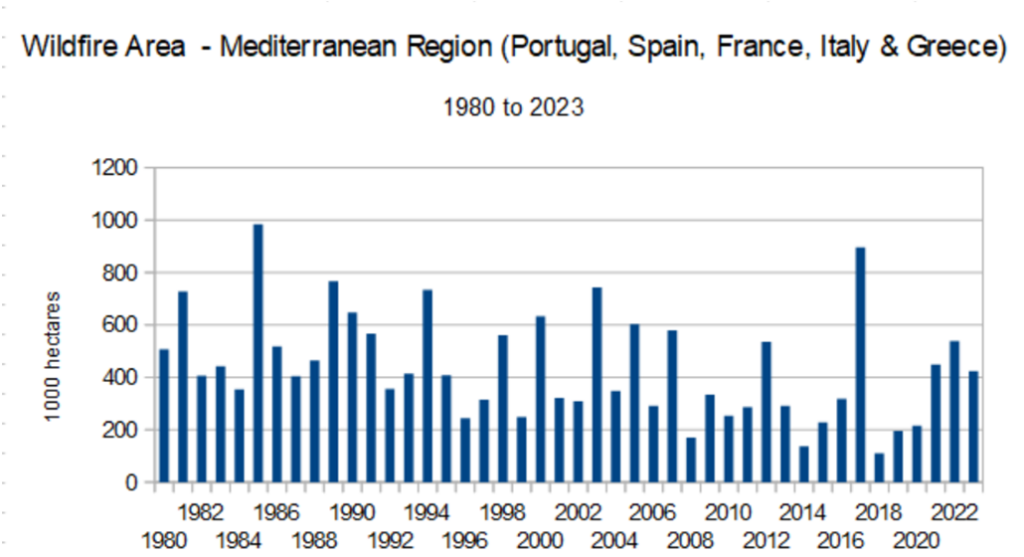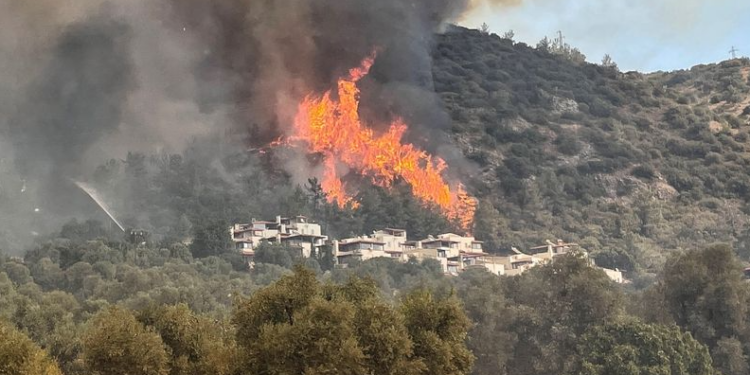Writing in the Daily Telegraph last July, Suzanne Moore reported that the “world is on fire – and we can’t ignore it any longer”. She was noting the usual outbreaks of summer wildfires in southern Europe and suggested a retreat by cautious holiday makers in Rhodes away from one conflagration was “what climate refugees look like”. The Guardian was in similar hysterical mode observing that the lesson from Greece was “the climate crisis is coming for us all”. Such was the level of Thermogeddon interest last summer it is curious that final figures for areas burnt during the year are missing from mainstream media. In the five largest southern European countries for which the EU provides separate data – Portugal, Spain, France, Italy and Greece – 2023 was only the 20th highest in the modern satellite burnt acreage record going back to 1980.
This is perhaps not surprising. Fire ‘weather’ is a potent tool in stoking up general climate anxiety and helps promote the need for a collectivist Net Zero political solution. The Guardian used video footage of tourists moving away from one wildfire last year to claim “survival mode” could easily pass for a “TV climate crisis awareness raising campaign”. An Agence France-Presse report in the Guardian quoted EU spokesman Balazs Ujvari as stating that fires are getting more severe. “If you look at the figures every year in the past years, we are seeing trends which are not necessarily favourable.”
Let us look at some of the figures, starting first with the graph below compiled by the investigative climate writer Paul Homewood.

As noted, the five major countries of southern Europe show many years since 1980 when wildfires consumed more hectares of land. Last year was an average period, easily beaten by 2017 and dwarfed by 1985. In fact the graph above from EU data shows that wildfire acreage over these countries has actually declined over the last 43 years.
Economic damage can be considerable, although the trend on this front shows little overall change over the last two decades across the EU.

Like many natural events, wildfires cause lives to be lost. Using this tragic loss of life to whip up climate fear is deplorable, not least since many wildfires are deliberately or accidentally started by humans. Greece had a bad wildfire season last year with the BBC reporting that 79 arrests had been made for arson. The BBC accepts that wildfires are common in Greece but “scientists say” there is a link between extreme weather events and climate change. Stefan Doerr of the Centre for Wildlife Research at Swansea University notes that arson “can more easily turn into fast-moving wildfires”. Arsonists, it seems, just love climate change.
Last year, the climate scientist Patrick Brown admitted that he had written a paper published in Nature that focused exclusively on how climate change had affected extreme wildfire behaviour and ignored other key factors. In particular he downplayed the information that 80% of wildfires are lit by humans. He laid out his whistle-blowing claims in an article titled: ‘I Left Out the Full Truth to Get My Climate Change Paper Published’. He knew not to try to quantify key aspects other than climate change because it would dilute the message journals like Nature want to tell, he observed, adding: “To put it bluntly, climate science has become less about understanding the complexities of the world and more about serving as a kind of Cassandra, urgently warning the public about the dangers of climate change.”
Wildfires are an easy propaganda win for climate alarmists. People die, property is destroyed and the published images are spectacular. But fires are a vital part of nature, always have been. They help clear away the debris that accumulates naturally in forests and scrub land and provide a path for regenerative growth. There is little evidence that natural trends are on the increase around the world, and none to suggest that humans play a part in natural ignition by burning hydrocarbons and releasing carbon dioxide into the atmosphere. In its sixth assessment report, the Intergovernmental Panel on Climate Change (IPCC) specifically ruled out human involvement in ‘fire weather’, both in the past and going forward to the turn of this century.
Chris Morrison is the Daily Sceptic’s Environment Editor.
Stop Press: Met Office update: As regular readers will recall, the Met Office recently came a cropper with a senior meteorologist stating last month on the BBC that storms in the U.K. were becoming more intense due to climate change. In reply to a subsequent freedom of information request from Paul Homewood, the Met Office admitted it had no evidence to back up the claim, but failed to correct the original statement. In a further letter to Homewood, it now accepts that there is no evidence ‘yet’ for an increase in wind gust speeds, although these are “projected to increase with future climate change”. Hardly a retraction since it still claims rainfall intensity, storm surges and wave heights are increasing with climate change. None of this can be proved – climate models are opinions, not evidence – while the IPCC also rules out human involvement in severe wind storms. It also rules out changes in river floods and heavy rain, along with coastal flooding and erosion.















To join in with the discussion please make a donation to The Daily Sceptic.
Profanity and abuse will be removed and may lead to a permanent ban.
The simpleton and the agenda driven bureaucrat always indulges in confirmation bias. The simpleton because they don’t know any better and only sees what is on the 6 O’Clock News, and the agenda driven bureaucrat because they never want to let a good crisis go to waste. —–So let us go the body who provides us with all of the “evidence” of climate change —The IPPC. —-They say they have not detected or attributed fire occurrence or area burned to human caused changes in climate.—Oh dear how inconvenient. —-Wildfires are part of the natural ecosystem and were actually worse in past centuries. Oh and one other thing. Most fires today are caused by people, either deliberately or by accident. ——–This is one of the problems with climate change politics that comes from pretend to save the planet politicians and their bought and paid for scientists, and it is that when everything that happens is supposedly due to your theory then you are not indulging in science anymore.
“Most fires today are caused by people, either deliberately or by accident.”
Correct.
Last summer on an access gate up on the Saddleworth Moors somebody had tied a huge vinyl ie professionally produced ‘flag’ which was emblazoned

 with a raging wild fire and the caption:
with a raging wild fire and the caption:
Danger. Wild fires
Absolute BS.
It is extremely difficult to set peat moors on fire without human intervention. Matches / lighters etc.
Thanks for your reply……..I cannot believe that only 5 comments have been made on this article. ——-The people are having their freedoms and prosperity stolen from them under false pretences of a “climate crisis” and yet only 5 people are saying anything about it on this site. —-So once again thanks for supporting what I often say on this website on this issue. —I am going to continue to support the fantastic work of Chris Morrison (and others) despite the British public being oblivious to the fact that they are being hoodwinked.
But they don’t think they’re being hoodwinked, that useful idiot in chief has them captivated. Yet they’ll be the first to start squealing when Net Zero scam really kicks in.
And don’t forget that Fire and Rescue Service resources around the Moors have been cut by a third because of ‘austerity’ in the past 10-15 years. That actual fact is never mentioned on the BBC….
2023 was a campaign of Arson, Arson, Arson. Most of the wildfires in Greece, Quebec, Aust, Calif. etc were human caused. Apparently this is a crime, unless you are a green fascist, then you are applauded as ‘the science’.
Add in poor land management by government.
IPCC is a political group, they don’t issue anything ressembling ‘science’.
The narrative is pushed for money, power, control, and to end our industrial economy.
As with most of ‘the science’ it is the opposite of reality. All bow and hail.
And a lot of it is just stupid accidental side effects, by those who did not actually intend to cause a wildfire (given the definition of arson).
A peak in economic loss in 2007 and 2017, two data points a decade apart, so not a trend (yet) but what happened in those two years, particularly, 2017 to make them stand out?
Interesting to see the graph “General trends in the period 2006-2023” at PowerPoint Presentation (europa.eu) shows a clear upward trend in “Fires above 1000ha”.
The question it raises is why did the EU use 2008 as the starting point?